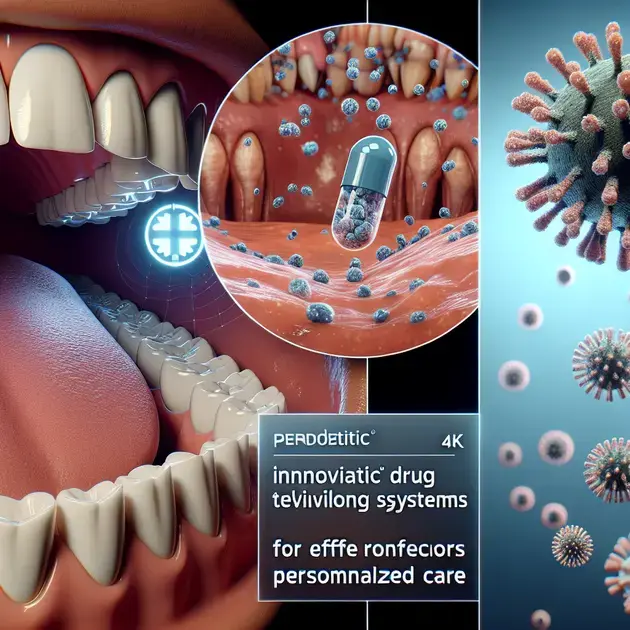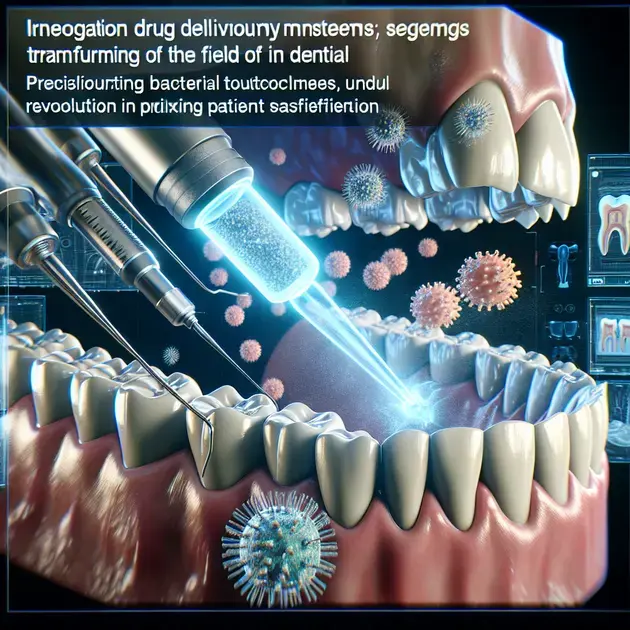Are you looking to learn more about the facts surrounding medication for periodontitis? In recent years, there have been significant advancements in the types of medications available for treating this condition.
Understanding the various options and how they can help manage periodontitis is crucial for maintaining good oral health. Let’s delve into some important insights into medication for periodontitis.

Key Facts to Know
When it comes to understanding periodontitis medication, there are key facts that everyone should know. Firstly, periodontitis is a severe gum infection that can lead to tooth loss if left untreated. It is essential to seek professional advice from a dentist or periodontist if you suspect you have periodontitis. Additionally, medication is often prescribed as part of the treatment plan for periodontitis, alongside other interventions such as deep cleaning and regular dental check-ups.
To find reliable information on periodontitis medications and treatment options, a recommended resource is the American Academy of Periodontology website. This site offers detailed explanations of various medications used to treat periodontitis, their benefits, and potential side effects. By accessing this information, individuals can educate themselves on the different types of medications available and make informed decisions about their periodontal health.
Understanding the key facts about periodontitis medication is crucial for managing the condition effectively. By staying informed and following recommended treatment guidelines, individuals can improve their oral health and prevent further complications associated with periodontitis.
Types of Medications for Periodontitis
There are several types of medications commonly used in the treatment of periodontitis. Antibiotics are frequently prescribed to combat the bacterial infection that causes gum disease. Examples of antibiotics commonly used in periodontal treatment include doxycycline and metronidazole. These medications work by targeting and eliminating the harmful bacteria in the gums, helping to reduce inflammation and prevent further damage to the teeth and surrounding tissues.
In addition to antibiotics, antimicrobial mouth rinses are another type of medication used to treat periodontitis. These mouth rinses contain active ingredients that help to kill bacteria in the mouth and promote healing of the gums. Chlorhexidine is a common antimicrobial mouth rinse recommended for individuals with periodontal disease.
To learn more about the different types of medications for periodontitis and how they work, a useful resource is the National Institute of Dental and Craniofacial Research (NIDCR) website. The NIDCR provides comprehensive information on oral health conditions, including periodontitis, and the medications used to treat them. By consulting this resource, individuals can gain a better understanding of the various medications available and their role in managing periodontal disease.
Benefits of Medication Treatment
Medication treatment for periodontitis offers several benefits for individuals with gum disease. One of the primary advantages of medication therapy is its effectiveness in fighting bacterial infections in the gums. Antibiotics and antimicrobial mouth rinses are specifically designed to target the bacteria that cause periodontitis, helping to reduce inflammation and prevent further progression of the disease.
Another benefit of medication treatment is its convenience and ease of use. Unlike surgical interventions, medication therapy for periodontitis can be easily administered at home, following the instructions provided by the dentist or periodontist. This makes it a convenient option for individuals looking to manage their gum disease without undergoing invasive procedures.
For more detailed information on the benefits of medication treatment for periodontitis, individuals can refer to the American Dental Association (ADA) website. The ADA offers valuable resources on various treatment options for gum disease, including medications, and their potential benefits. By exploring this resource, individuals can gain insight into the advantages of medication therapy and its role in maintaining good oral health.

**Targeted Approaches for Periodontitis Treatment**
Introduction
Periodontitis is a common inflammatory disease affecting the soft and hard structures supporting the teeth, leading to gum recession, bone loss, and even tooth loss if left untreated. Traditional treatments for periodontitis include scaling and root planing, antibiotics, and in severe cases, surgery. However, targeted approaches are emerging as a more personalized and effective way to manage periodontitis.
Importance of Targeted Approaches
Targeted approaches for periodontitis treatment involve identifying the specific pathogens causing the infection and tailoring the treatment accordingly. This personalized approach allows for a more precise and effective treatment, reducing the risk of antibiotic resistance and improving overall outcomes for patients.
Advanced Diagnostic Techniques
One key aspect of targeted approaches is the use of advanced diagnostic techniques such as polymerase chain reaction (PCR) and next-generation sequencing to identify the specific bacteria causing the infection. By understanding the microbial profile of each patient, dentists can prescribe the most appropriate antimicrobial agents for targeted therapy.
Therapeutic Agents
In targeted approaches, therapeutic agents such as local antimicrobials and host modulatory agents are used to specifically target the pathogens causing periodontitis. These agents can be delivered directly to the site of infection, reducing systemic side effects and improving the effectiveness of the treatment.
Future Perspectives
As research in personalized medicine and targeted approaches continues to advance, we can expect to see even more innovative and effective treatments for periodontitis. By combining advanced diagnostics with targeted therapies, dentists can provide individualized care that addresses the root cause of the infection, leading to better long-term outcomes for patients.
**The Role of Precision Medicine in Managing Periodontitis**
Introduction
Precision medicine, also known as personalized medicine, is revolutionizing the way we approach healthcare by considering individual variability in genes, environment, and lifestyle for each person. When it comes to managing periodontitis, precision medicine plays a crucial role in tailoring treatment plans to the specific needs of each patient, ultimately improving outcomes and reducing the risk of disease progression.
Personalized Risk Assessment
One of the key aspects of precision medicine in managing periodontitis is the ability to conduct personalized risk assessments for each patient. By taking into account genetic factors, lifestyle habits, and environmental influences, dentists can identify individuals at high risk for periodontal disease and develop targeted preventive strategies.
Customized Treatment Plans
Using precision medicine approaches, dentists can create customized treatment plans that address the unique characteristics of each patient’s case. This may involve a combination of traditional periodontal therapies, targeted antimicrobial treatments, and personalized oral hygiene recommendations to optimize oral health outcomes.
Genetic Testing
Advancements in genetic testing have allowed for a deeper understanding of the genetic factors that contribute to periodontitis. By analyzing a patient’s genetic profile, dentists can identify genetic markers associated with increased susceptibility to the disease and tailor treatment strategies accordingly.
Predictive Analytics
Through the use of predictive analytics and data-driven insights, precision medicine can help dentists predict disease progression and treatment outcomes with greater accuracy. This proactive approach enables early intervention and targeted therapies, leading to improved periodontal health in the long run.
**Innovations in Drug Delivery Systems for Periodontitis**
Introduction
Drug delivery systems for periodontitis have seen significant advancements in recent years, aiming to improve the efficacy, safety, and patient compliance of periodontal treatments. Innovations in drug delivery systems are revolutionizing the way we administer medications for periodontitis, offering targeted and controlled release of therapeutic agents directly to the site of infection.
Local Drug Delivery
One of the key innovations in drug delivery systems for periodontitis is the development of local drug delivery devices, such as dental gels, films, and microspheres. These devices allow for the sustained release of antimicrobial agents directly into periodontal pockets, targeting the bacteria responsible for the infection while minimizing systemic side effects.
Nanotechnology in Drug Delivery
Nanotechnology has played a significant role in revolutionizing drug delivery systems for periodontitis. Nanoparticles can be engineered to encapsulate antimicrobial agents and facilitate their targeted delivery to the periodontal tissues, enhancing drug penetration and efficacy for improved treatment outcomes.
Controlled Release Systems
Controlled release drug delivery systems utilize biocompatible materials to control the release rate of therapeutic agents over an extended period. By maintaining optimal drug concentrations at the site of infection, these systems enhance the effectiveness of periodontal treatments and reduce the frequency of drug administration for improved patient compliance.
Smart Drug Delivery Devices
Emerging technologies are now integrating smart drug delivery devices, such as microchips and sensors, to monitor drug release kinetics and patient response in real-time. These devices enable personalized dosing regimens and allow for adjustments based on individual treatment needs, paving the way for precision medicine in periodontal therapy.
Conclusion
Targeted approaches for periodontitis treatment are paving the way for a more personalized and effective management of this inflammatory disease. By identifying specific pathogens causing the infection and tailoring treatments accordingly, dentists can provide precise care, reducing the risk of antibiotic resistance and enhancing overall patient outcomes. Utilizing advanced diagnostic techniques like PCR and next-generation sequencing allows for a deeper understanding of each patient’s microbial profile, leading to the prescription of the most suitable antimicrobial agents for targeted therapy.
Precision medicine plays a crucial role in managing periodontitis by conducting personalized risk assessments, creating customized treatment plans, and utilizing genetic testing to tailor strategies based on individual genetic markers associated with disease susceptibility. The use of predictive analytics enables dentists to predict disease progression accurately, facilitating early intervention and targeted therapies, ultimately improving long-term periodontal health.
Innovations in drug delivery systems, such as local drug delivery devices, nanotechnology applications, controlled release systems, and smart drug delivery devices, are enhancing the efficacy, safety, and patient compliance of periodontal treatments. The sustained release of antimicrobial agents directly into the infection site minimizes systemic side effects, while nanotechnology ensures improved drug penetration and efficacy. Controlled release systems maintain optimal drug concentrations, reducing the frequency of administration for better patient compliance. Smart drug delivery devices monitor drug kinetics and patient response in real-time, enabling personalized dosing regimens and adjustments for precision medicine in periodontal therapy.



